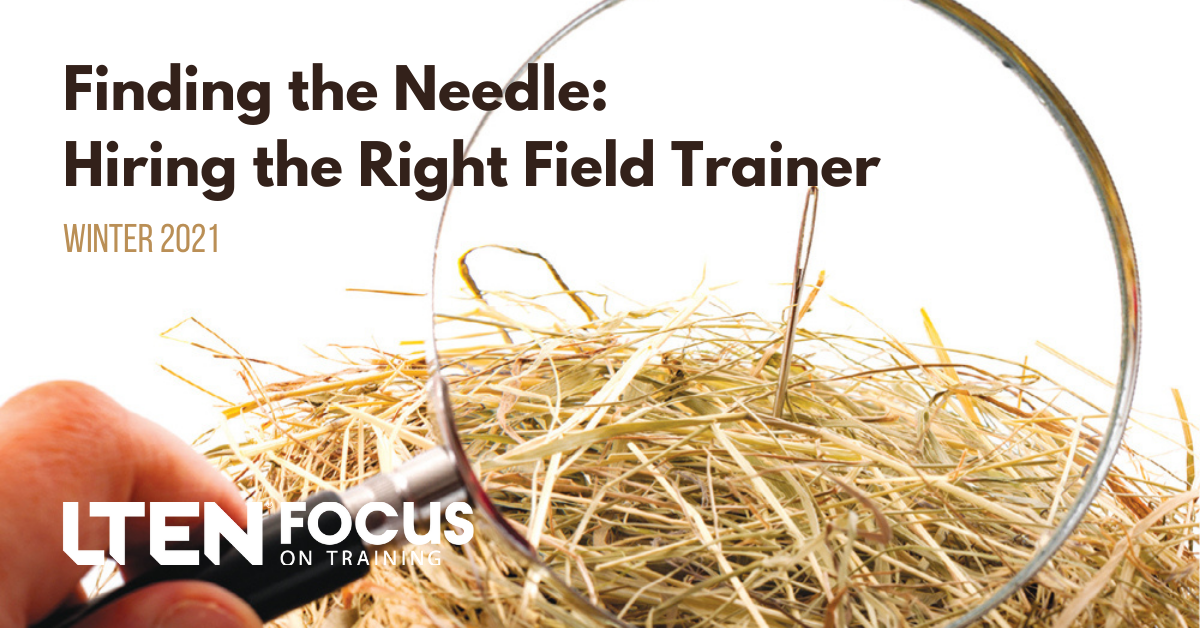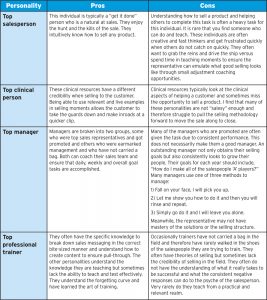
Finding the Needle: Hiring the Right Field Trainer
FEATURE STORY – By James Ashby
Where can you find someone with all these capabilities?
So, your executive team has bought in to investing in field sales trainers (FSTs), now what? Where do you start hiring and what will you look for? Training backgrounds? Top salespeople? Managers?
As I contemplated the potential composition of our new team, panic again crept in. Where would I be able to find someone with all these capabilities? After all, these key individuals would have the ability to transform the minds of regional managers, seasoned sales veterans and novice representatives and to shape the interworking for the new hires.
These individuals must walk a fine line to insert themselves as a value to the field sales representatives and not become the doom-andgloom “hall monitor.” This equates to finding the needle in the haystack. In our business line, we need someone with superior:
 Understanding of hospital market forces.
Understanding of hospital market forces.- Understanding of hospital daily task and key performance indicators (KPI) for health systems.
- Understanding of department-level requirements to achieve KPIs.
- “Solution Selling” skill set to ensure coaching and pull-through in the field.
- Clinical knowledge of patient, nursing and physician needs.
- Objection handling and negotiation techniques.
- Ability to effectively coach both frontline representatives and the coaches themselves.
- Ability to create and deliver training material to the front line with industry best-practice alignment.
- Ability to self-manage on daily tasks and efforts.
As the recruiters and I set out to find these individuals, we found that rarely do these people exist with all levels of mastery for each of these buckets.
Figure 1 breaks down the various pros/cons I found with each FST candidate type.
Finding the Needle
Once we addressed the pros and cons of each person, we quickly realized that we would indeed be looking for a needle in a haystack to find someone with a complete list of these talents. In addition, the total cost of employment (TCE) would be substantial. In a current market where we have 3.5% unemployment, finding these ultra-talented individuals would be a difficult recruitment task.
Working in the medical sales industry for more than 20 years has allowed me to realize there really is a very limited “A” player salesperson mentality. Often these “A” players come by sales naturally. They often are puzzled why everyone else is not finding it just as easy to sell the solution.
These “A” level sales individuals are zealous for their customers and winning is not just a competition for them, it is a self-expectation. They have a customer-focused mentality and have figured out that the monetary win will follow if they outwork the competition and aid the customer in not only delivering but exceeding their own results.
The Transformational Fit
As I contemplated the potential composition of our new team, that cold shiver again crept down my spine. Where can you find someone with all the attributes you need and who can deliver them in a truly unobtrusive way?
That is the transformational sales change every organization is seeking. When used correctly, these FSTs are able to transform the entire sales team to make certain we accomplish three things:
- Share best practices across areas.
- Measure real performance indicators.
- Properly cut the dead weight.
I cannot tell you how many organization meetings I have sat in where transformation is discussed and even rolled out, only to fail. In my assessment, transformation can only successfully take place when the leaders:
 Share the problem/goal.
Share the problem/goal.- Create field-level buy-in.
- Discover what the current problem/environment is within the organization.
- Discuss/discover how together you are going to overcome the challenges (pain) of change.
- Co-create a road map with everyone’s buy-in on realistic changes.
- Determine how everyone shares in the reward once the transformation occurs.
Conclusion
As with every organization that strives for transformation, the buy-in belief is key! For us, FSTs are a starting point to change the organization. These individuals can bridge a gap in skills from the sales managers and ensure that each person feels valued in the organization.
In our efforts to transform the organization, we hired each of these personalities and created knowledge transfer to ensure that each field sales trainer has the positive attributes from top sales professionals, clinical leaders, management and seasoned sales professionals.
James Ashby is a senior manager of training with Philips. Email James at james.ashby@philips.com.










